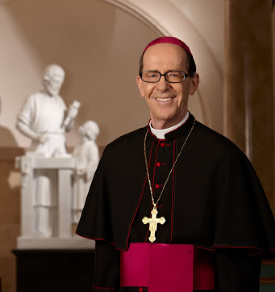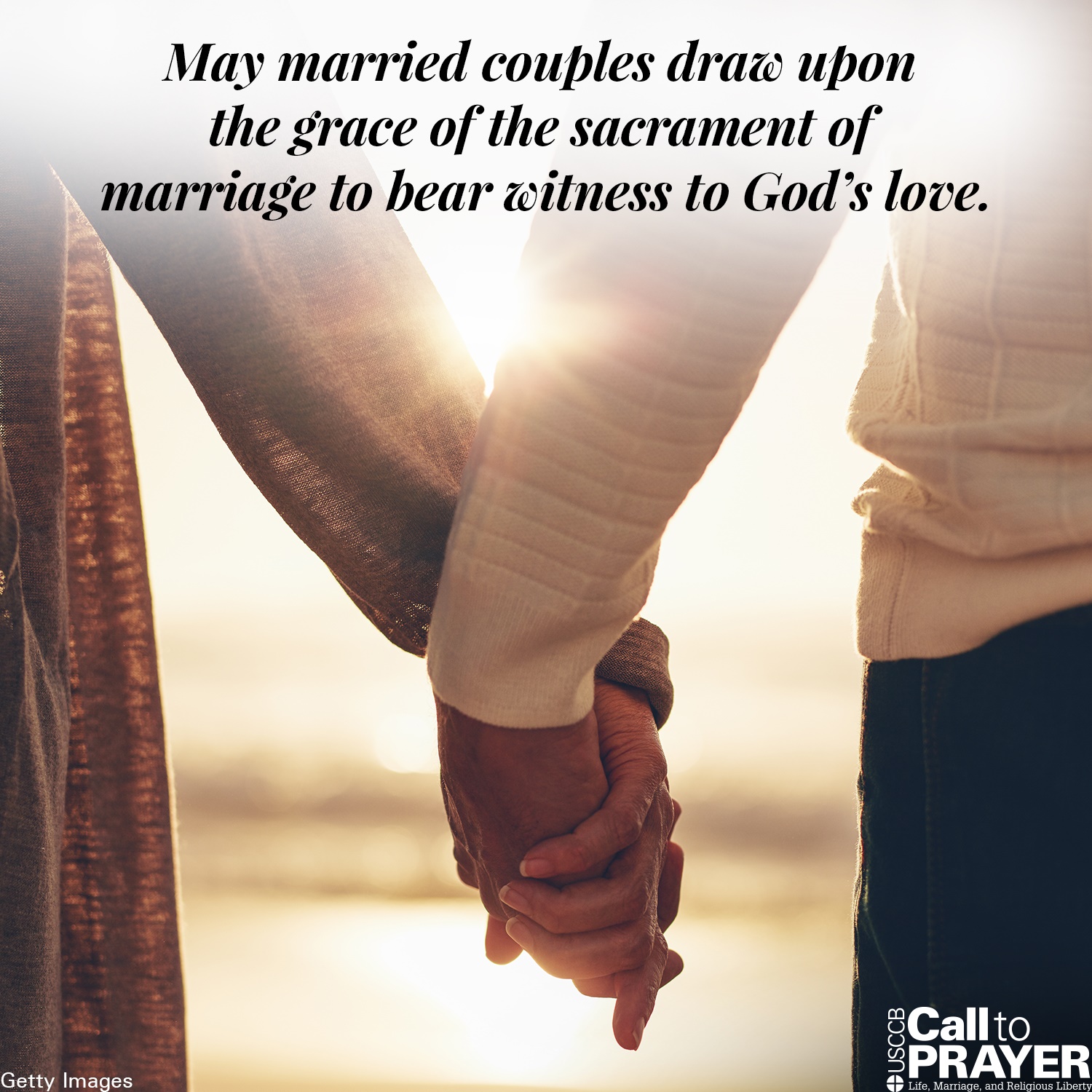Reflecting on the Nature of Marriage Series
 Reflecting on the Nature of Marriage Series
Reflecting on the Nature of Marriage Series
We began the “Nature of Marriage” blog series by discussing the basic philosophical concept of nature: why? For the past year, we have discussed the Catholic Church’s teachings on marriage, sexuality, and the family — tackling some tricky ethical questions in the process. Just to name a few, we have discussed the ethics of contraception, divorce, chastity, and in vitro fertilization. It was the purpose of this blog to explain how a proper understanding of human nature is essential for answering such questions. As Catholics, we believe that human nature is the grounding for certain truths about the human person. For instance: that mankind was created male and female, that the human being is ordered toward procreation and family life, and that the human being is by nature a social creature. It is impossible to understand what is good for us, our families, and broader society without knowing who we are and who God designed us to be.
One idea stressed in this blog was that the human being holds a unique place in the whole of God’s creation. Today, it is common to appeal to “nature” without considering the uniqueness of human nature. That something occurs “in nature” does not necessarily mean that it is good for us. There are many activities that may be natural to, say, a beaver, bird, or fish that are not natural for human beings.
Our human nature is the standard against which we judge whether or not an activity is good. In fact, the ability to deliberate about activities is a defining trait of human nature. Human beings are not mere animals but rational animals. Natural reason means, among other things, that we have the ability to guide ourselves in our actions and lead a good life.
But, as Catholics, we believe that human nature is caught up in the divine. What does this mean? First, consider the fact that human beings are the creation of a wise and loving God. We are able to recognize that each and every human being is made in the image and likeness of God. From this, we know that each and every human person has inherent dignity and deserves to be treated as such. Second, we believe that all human beings naturally seek God Himself insofar as human beings naturally seek the truth, desire to understand their place in the world, and wonder about what they must do to be a good person. In the words of Pope Saint John Paul II, “No one can escape from the fundamental questions: What must I do? How do I distinguish good from evil? The answer is only possible thanks to the splendour of the truth which shines forth deep within the human spirit…”[1]
St. Thomas Aquinas, whose ideas we discussed in this blog series, also recognizes the certain divine quality of human reason. St. Thomas teaches that God designed human reason pre-programmed, so to speak, with the basic moral principle to do good and avoid evil. This is written into our human nature. The predisposition to seek goodness is a way in which we “participate in the wisdom and goodness of the Creator” (CCC 1978). Interestingly, then, the division between the natural and the divine is not so cut and dry. This blog has sought to explain that Catholic moral teaching on the issues of marriage and family life is founded upon the notion that mankind was created by God for a unique purpose and that God cares about who we are and what we do.
Of course, this blog didn’t and can’t cover every issue pertinent to Catholic moral teaching, and new challenges face us every day. But I hope that this blog laid a foundation for approaching a wide array of ethical questions that one may face as a Catholic person in the modern world. To reiterate the introduction to this blog series: it is more important than ever to understand and promote the true nature of the human person and the true nature of marriage. It is more important now than ever to remember that nothing in God’s creation is arbitrary, that (in the words of Aristotle) “nature does nothing in vain”—to remember that not only is marriage unique, it is unique for a reason.
[1] Pope John Paul II. Encyclical Letter Veritatis Splendor. Vatican City: Libreria Editrice Vaticana, 6 August 1993. http://www.vatican.va/content/john-paul-ii/en/encyclicals/documents/hf_jp-ii_enc_06081993_veritatis-splendor.html
About the Author: Bridget Groff is an M.A./Ph.D. student in the School of Philosophy at the Catholic University of America. This blog post concludes her work as a part-time intern for the Subcommittee for the Promotion and Defense of Marriage at the United States Conference of Catholic Bishops.
Archive
Made for Love Ep 55: Remarriage after Death
When Catholics marry, they promise to be together “as long as we both shall live.” Death brings about the end of a marriage, and the other partner is free to marry again. Today we’ll hear the stories of men and women who have married after losing their first spouse to death. The episode features Randy and Lucy Hines and Andy and Beth Huseman.
On Podbean:
Or Soundcloud:
Archive
Made for Love Ep 52: Enjoying the Seasons
Catholics have so many seasons and feast days to celebrate and live: how do you do this well? Today we’re sharing ideas from families about living Advent, Lent, and other feast days. Features Bishop Milan Lach, SJ, Bishop Konderla from the Diocese of Tulsa, and Andy and Sara Sefranek.
On Podbean:
And Soundcloud:
Archive
Made for Love Ep 51: Engagement: Planning a Wedding or a Marriage?
Engagement is an exciting time for a man and a woman who have decided to marry; but how do they spend those months before the wedding? Planning for their marriage, or planning the party? This episode features Bishop Warfel from the Diocese of Great Falls-Billings, Bishop Cary from the Diocese of Baker, Sophie Caldecott, and Cadence McManimon (who missed her own wedding!).
Here’s Sophie’s website including the letter that is referenced in the podcast; and here’s Cadence’s website!
On Podbean:
And Soundcloud:
Archive
New Blog Series: The Nature of Marriage
A few years ago, I was discussing the Church’s position on contraception with a friend of mine. He said, “Well, getting sick is natural, and we take medicine to stop the process of becoming ill. Why is taking birth control to stop the process of becoming pregnant any different?” I must admit, I was a little stumped. I knew that the two cases—becoming ill and becoming pregnant—were different, but I couldn’t quite parse out how. I had an intuition that it had something to do with the way my friend was using the word “natural.” Surely, I thought, getting sick and getting pregnant are two different kinds of natural processes. But how?
We all have a general—perhaps a vague—idea of what “natural” means. Such is obvious by the fact that we assume the existence of nature in our everyday language. When two dogs struggle against their leashes to sniff and inspect one another, we say, “Well, they’re just doing what comes naturally!” We say things like, “I hadn’t eaten breakfast or lunch, so naturally, I was starving come dinnertime.” Not only do we talk about the natural, but we also have an intuition that what is natural is good. For instance, many of us favor natural remedies as opposed to prescriptions. Many of us gravitate toward brands that include the word “natural” in the name, brands that promise products free of chemicals and food free of additives and preservatives.
As Catholics, we have an especially rich understanding of the natural as good. We take human nature to be the grounding for certain truths about the human person: that mankind was created male and female, that the human being is ordered toward procreation and family life, that the human being is by nature a social creature. All these things we regard as good insofar as they are integral aspects of human nature, and to live out these aspects of human nature is what enables the human being to flourish. When we recognize a common human nature and recognize this nature as good, we therefore know also that it is good for everyone to flourish. In other words, we recognize that to flourish is a right, so to speak, of each and every person. To recognize this fact gives way to the concept of human dignity, which means to respect and, indeed, to help our fellow human beings flourish and live-out their human nature. We cannot, therefore, truly know what it means to say that human beings have worth and dignity, what is good for mankind, without a concrete notion of human nature.
In 1993, St. Pope John Paul II published his encyclical Veritatis Splendor in view of widespread confusion and disagreement in the areas of ethics and moral theology. The mission of the encyclical was to recall and restate the fundamental truths of Catholic doctrine as it pertains to the Church’s moral teaching. The overarching theme of Veritatis Splendor is to affirm the natural and eternal law, to affirm and defend a real and immutable human nature, and to affirm the fact that “the power to decide good and evil does not belong to man, but to God alone.” (VS, no. 32) In other words, St. John Paul II teaches us in Veritatis Splendor that to know human nature and to know it as good and created by God are essential to understanding the Church’s moral teaching.
Taking for its inspiration St. John Paul II’s Veritatis Splendor, this blog series will answer questions about the Church’s teaching in the areas of human sexuality, marriage, and the family— with an eye toward human nature and natural law. For example: What does it mean to say that marriage is a natural institution? In what sense is marriage natural? Why are unity and procreation marriage’s natural ends?
In the blog entries to come, I hope to provide some clarity and insight into the nature behind Church teaching and to answer some of these tricky questions that sometimes leave us stumped. These are questions that Catholics and non-Catholics alike struggle with and, if left unanswered, can be a source of confusion, frustration, and anxiety. It is more important than ever to understand and promote the true nature of the human person and the true nature of marriage. It is more important now than ever to remember that nothing in God’s creation is arbitrary, that (in the words of Aristotle) “nature does nothing in vain”—to remember that not only is marriage unique, it is unique for a reason.
About the Author: Bridget Groff is an M.A./Ph.D. student in the School of Philosophy at the Catholic University of America. She currently works part-time at the United States Conference of Catholic Bishops as an intern for the Subcommittee for the Promotion and Defense of Marriage.
Archive
Made for Love Ep 44: What to Expect When You’re Expecting Multiples
Surprise! You aren’t expecting one child; you’re expecting two… three… four…! How do Catholic families adjust to taking care of multiples? This episode features Paul Gondreau of Providence College, Stefan and Valeri Syski and Matt and Jill Kerr (triplets!).
On Podbean:
And Soundcloud:
Archive
Made for Love Ep 41: The Four Temperaments
Do you know the four temperaments? Which one are you? Today we focus on the temperaments and marriage. Some temperament matches are going to be “easier” than others, but no matter what temperaments you and your spouse have, you can still help each other get to heaven! This episode features Art and Laraine Bennett, the authors of The Temperament God Gave You (and others), Nick and Lucy van Schaijik, and Brady and Sarah Wilson.
Listen on Podbean:
Or Soundcloud:
Archive
Made for Love Ep 38: Adult Children of Divorce, Part Two
When your parents get divorced, it’s not a one-time event. It remains with you for life. Today we continue the conversation with three adult children of divorced parents about the road to healing and how they seek to build up their own families. This episode features Dan Meola, Beth Sri, and LeeAnne Abel.
On Podbean:
And Soundcloud:
Archive
Bishop Olmsted at the National Catholic Prayer Breakfast
Bishop Olmsted of the Diocese of Phoenix spoke at the National Catholic Prayer Breakfast on April 23, 2019. His full address is available; He spoke on the importance of continuing to preach the good news of marriage and family.
He spoke about gender ideology, among other topics, noting, “Any rejection of bodiliness will immediately target two beautiful but demanding and sometimes inconvenient realities: marriage and the child.”
Archive
Call to Prayer: February 15, 2019
Archive
Made for Love Ep 32: The Love Languages
Happy National Marriage Week!!!! (Feb 7-14) Check out For Your Marriage for lots of events and special posts for this week.
Described in a popular book by Gary Chapman, the five love languages are five different ways that we human beings give and receive love; and some of them “speak” to us better than others. The thing is, we don’t even necessarily realize it, or how to talk about it. Today on Made for Love we’re talking about the five love languages in marriage with Francis and Julia Dezelski, Bryan and Liz Smalley, and Craig and Stephanie Rapp.
On Podbean:
And Soundcloud:
Archive
Made for Love Ep 25: Catholics and Pornography
“Porn Kills Love.” This slogan from “Fight the New Drug” resonates with Catholic teaching about pornography. This episode is about Catholics dealing with addiction to pornography. It includes DJ Hueneman, Jeff and Annette Kohn, Kevin and Krista Burridge, Patty Breen, and Perry West.
Soundcloud:
Or Podbean:
The 2005 USCCB statement “Create in Me a Clean Heart” (Also in Spanish) addresses the crisis of pornography in today’s world. There’s an abridged version if you are pressed for time! The conference also publishes pamphlets to help particular groups:
- For Married Couples
- On Raising Children
- For Priests
- For Those Struggling with Addiction
The USCCB’s For Your Marriage website also has resources and help for people dealing with pornography.
The journal Humanum has a beautiful witness story: The Cleansing of the Temple: Casting Pornography Out of Marriage
Archive
Made for Love Ep 23: Catholic, Divorced
Catholics who are divorced go through a hard process, and can feel forgotten, marginalized, or unwanted at our parishes. How can we make sure that is not the case? This episode features Rose Sweet of Divorce Healing and Surviving Divorce, Patty Breen, Brad Grey, and Fr. Steve Porter.
On Soundcloud:
And Podbean:
Patty Breen has written a few pieces on divorce for Blessed is She and Catholic Match Institute, such as: “3 Myths about Catholics and Divorce” and “How to Navigate the Worst Days After Divorce”
Archive
Made for Love Ep 19: Cultural Differences in Marriage
Navigating cultural differences in marriage can be a challenge but brings great rewards. This episode features Dusan and Elizabeth Turcon, Christine and Ysias Martinez, Justin and Bernadette McClain, and Dunn and Mary Estacio.
Available on podbean:
Or soundcloud!
Archive
Made for Love Ep 17: NFP part one
Natural Family Planning, Part One!
Chastity doesn’t mean abstinence, but rather integrating one’s sexual impulses into love. That’s obviously important in marriage. Anticipating Natural Family Planning awareness week (July 22-28), we talk about NFP with Amy and Duston Stout, Mark and Leslie Wolf, and Rachel and Dax.
Tons of information on NFP is available at the USCCB website.
For example, here’s a page with current medical research about fertility awareness.
If you are interested in finding a class, here’s a directory that includes programs with distance learning.
National NFP Awareness Week is July 22-28, 2018. This year’s theme is “Generations of Love.”
And since Rachel talked about a few books in the podcast, here are links to those:
Life-Giving Love by Kimberly Hahn and John Paul II’s letter Familiaris Consortio
Archive
Made for Love Ep 16: Humanae Vitae 50 Years Later: Part 2
On today’s Made for Love, we continue to look at Humanae Vitae fifty years later. What is the Church’s teaching on the “transmission of life”? This episode features Chris and Becky Wilson, Sister Helena Burns, fsp, Chris Reynolds from the Couple to Couple League, Dr. John Grabowski of CUA, and Dr. Theresa Notare of the USCCB’s NFP office.
Here are the Resolutions of the Lambeth Conference of 1930.
Archive
Made for Love Episode 15: Humanae Vitae Anniversary (Part 1)
Humanae Vitae Part 1
On today’s Made for Love, we look at Humanae Vitae from the perspective of fifty years of change. What is HV all about? Have Pope Paul VI’s predictions come true? This episode features Bishop Ricken (Green Bay), Bishop Rassas (Auxiliary in Chicago), Dr. John Grabowski of CUA, Sister Helena Burns, fsp, Dr. Theresa Notare of the USCCB’s NFP office, and Dr. Lionel and Janet Yaceczko.
Here’s the 1968 Encyclical Humanae Vitae that we are talking about today. That’s the Vatican translation, as Dr. Lionel Yaceczko reads it on the podcast. Here’s another translation, by Dr. Janet Smith (scroll down to find the encyclical).
The USCCB NFP office is keeping an up-to-date list of events and resources for the anniversary.
Here’s Dr. John Grabowski’s faculty page at the Catholic University of America.
Archive
Marriage is a Share in the Plan for Creation
Check out Bishop DiMarzio’s column on marriage in his Diocesan paper (Diocese of Brooklyn).
Archive
Archbishop Wenski: Church’s defense of marriage not based on ‘hate’
Archbishop Thomas Wenski of the Archdiocese of Miami recently published this article on the Church’s defense of marriage. It is also available in Spanish.
This is a great reminder that the Church’s defense of marriage as the union of one man and one woman has not ended because of the Supreme Court’s redefinition in 2015.
Archive
Archbishop Kurtz on FADA
Archbishop Kurtz of Louisville recently contributed an op-ed about the First Amendment Defense Act (see the USCCB letter of support) for the local paper. Check it out!




